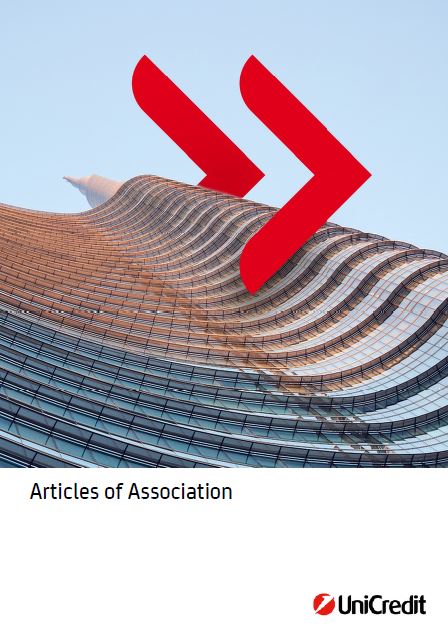Articles of Association and Code of Ethics
We constantly encourage our employees, external associates and business partners to pursue the business objectives in accordance with the law and the basic principles of transparency, informed management and business ethics.
Our commitment to encourage business ethics has become stronger in recent years and our mindset is to Win. The Right Way. Together.
This is what will enable us to deliver sustainable long-term success and create a Culture that each of us is part of and can be proud of.
A Culture that puts our Values of Integrity, Ownership and Caring at the heart of our decision-making and everything we do.
Our governance and commitment to ethics is based on a series of documents, procedures and policies.
The Articles of Association contain the rules of operation of UniCredit, supporting and integrating the applicable laws. They include various governance provisions aimed at ensuring the smooth running of corporate activities.
The Articles of Association may be amended by an Extraordinary Shareholders' Meeting or by the Board of Directors in specific cases or upon delegation of Extraordinary Shareholders' Meeting.
The Articles of Association of UniCredit were last amended in clause 5 in execution of the resolutions of the Extraordinary Shareholders' Meeting of 27 March 2025.
The "Code of Ethics in accordance with Legislative Decree 231/2001" constitutes an integral part of the Organisation and Management Model and contains the rules aimed at ensuring that the behaviour of the target audience will always be inspired by the principles of integrity, cooperation, loyalty, transparency and mutual respect and the avoidance of conduct that could constitute the criminal or administrative offences included in the list of Legislative Decree 231/01.
The Code of Ethics is valid for the parent company, foreign branches and Italian subsidiaries and applies to the members of the UniCredit corporate bodies and all staff and external parties such as consultants, agents, suppliers and commercial partners.

The aim of the Code of Conduct is to promote the culture of compliance, providing a description of rules, standards, professional ethics and a commitment to sustainability.
The Code of Conduct lists the principles that all UniCredit employees and related third parties have to comply with in order to ensure a high standard of professional conduct and integrity when carrying out the activities for or on behalf of the bank. It should therefore be considered as a point of reference, a source of information that allows the line to be drawn between acceptable behaviour and unacceptable behaviour in day-to-day work.
Approved by the Board of Directors on 5 July 2022, it was drawn up in line with the Group values.
Our group has adopted a zero tolerance policy to acts of corruption by employees or third parties linked to UniCredit. We prohibit facilitating payments and we do not permit transfers of anything of value to public officials without prior authorisation.
The Group approach to the prevention and fight against corruption is set out in the Group Compliance Policy on the fight against corruption and associated operating rules that are periodically reviewed.
For the purposes of the Policy, an act of corruption refers to giving, offering, promising, receiving, accepting, asking or soliciting, directly or indirectly, monetary or non-monetary benefits, tangible or intangible, in order to obtain or maintain an unlawful advantage in the performance of the business activities.
All employees will be responsible for complying with the Policy and the Operating Rules, the corresponding local internal rules and procedures and all the anti-corruption laws applicable in the exercise of their jobs. They will also have to report to the local Anti-Corruption Officer or the local Compliance manager of any act of corruption, that took place or was attempted, that they become aware of, whether the act of corruption was proposed, carried out or received. Potential acts of corruption can also be reported in accordance with the Global Policy on Whistleblowing.
Various controls were put in place to monitor the effectiveness of the Group's approach to the fight against corruption.
Conflict of Interest refers to any matter involving the Group, its Relevant Personnel and/or Stakeholders, where either the Group or an Employee is in a position to exploit a professional or official capacity in some way to obtain an undue advantage, for either Group or personal benefit (also potentially to the detriment of the Group) damaging one or more Customer or groups of Stakeholders.
A conflict of interest exists even if there is only the potential for the appearance of impropriety, even if no unethical or improper act results.
The Group provides a wide range of products and services to a diversified client base and consequently it has to face a number of potential conflicts of interest considering the different kinds of relations and Stakeholders like, for example, Customers, the Shareholders, the Authorities, the Group or part of it.
The Policy sets out rules and standard to be implemented by the UniCredit Group for properly detecting, managing and recording conflicts of interest.

